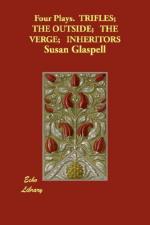|
This section contains 3,769 words (approx. 10 pages at 400 words per page) |

|
In the following essay excerpt, Galbus examines elements of The Verge within the context of Socratic and Platonic influences.
Susan Glaspell's play The Verge (1921) depicts the story of Claire Archer, who attempts to breed a unique plant while her husband, sister, daughter and friends worry that her obsessive quest is driving her mad and vainly attempt to divert her attention. Glaspell refers to Plato in the first stage direction, asserting that a winter storm outside Claire's greenhouse would reveal the inherent Platonic forms of nature on the frost patterns of the glass. From that moment forward, "form" becomes the pivotal term of the drama. Claire tends her horticultural experiments and protests the confining forms of language, art, motherhood, and traditional relationships between people while expressing her desire for destruction and avoiding explanations of her experiment unless coerced. Glaspell utilizes ancient Greek philosophy and culture to dismantle Plato's...|
This section contains 3,769 words (approx. 10 pages at 400 words per page) |

|




